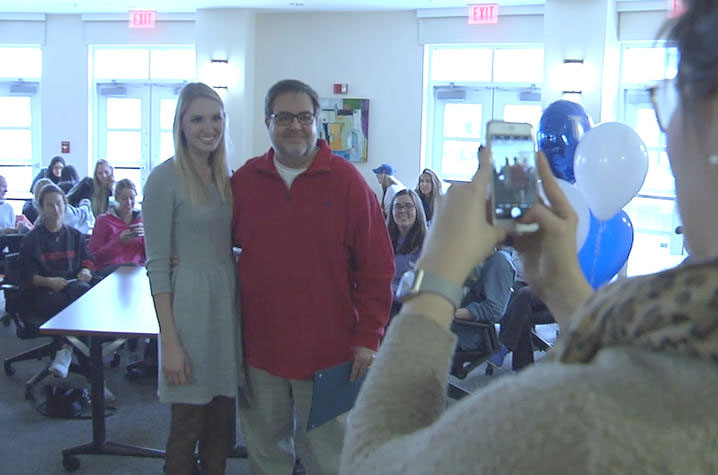Why I Love Undergraduate Research
Nov 20, 2023
By Richie Andreatta, PhD, ASHA Fellow
Most recent recipient, CHS Excellence in Faculty Scholarship Award, Senior Scholar
Professor in the Department of Communication Sciences & Disorders (CSD) and in the Rehabilitation and Health Sciences PhD Program (RHB), in the College of Health Sciences
Director of Undergraduate Studies for the CSD department
Director of Undergraduate Research Program for the College of Health Sciences
I have always thought undergraduate research was truly a win-win situation for both faculty and students. Faculty receive help on their research work, helping propel and expand their research agendas, and students learn about the ins and outs of research directly from world-class experts in that field.
I think most faculty are strongly interested in sponsoring undergraduate students in research because we all have this need to mentor and foster interest in our own areas of science. I know for a fact, given the number of inquiries and requests that I receive weekly, that undergraduate students are keenly interested and eager to get involved in research with our outstanding faculty.
When I was given the chance to lead the CHS undergraduate research program back in 2019, I quickly realized that I had a golden opportunity to help a great many students develop not only an interest in science, but develop a greater awareness of the importance and value of science to their lives.
Getting students active in research during their undergraduate years is not solely about moving them into research-based careers and PhD programs. What is important for them to appreciate is that the process of research is the process of learning: Research is learning and learning is research.
The difference is that when students engage in “mentored research” experiences, they are explicitly made aware of methods and strategies that can help them answer all types of questions now, and into the future.
I want the CHS undergrad research program to be something that every student participates in at some point in their undergraduate years. The automatic expectation of participating in undergraduate research is what I want others to see as a defining aspect of our College’s culture of learning and undergraduate education.
Helping me accomplish this goal are a group of extraordinary and passionate faculty who go out of their way to make research come to life for our students. I know that I’m biased, but I believe that CHS truly has the most dynamic and multi-talented faculty on this campus.
The opportunity for undergraduate students to work closely with our faculty on a common goal is truly exceptional.
Interested in undergraduate research? Click here.
EXAMPLES OF UNDERGRADUATE RESEARCH:
We have students working with faculty …
- investigating how and why patients recover muscle function after long-term stays in ICUs. This of course has become a major issue with COVID.
- to understand the cellular pathways and the genetics underlying muscle function in aging populations.
- helping to develop novel ways to train students to manage and treat individuals who have aphasia that emerges after stroke.
- researching ways to make everyday toys and play equipment accessible to those with physical and performance differences.
- investigating the behavioral, performance and emotional consequences of knee and ankle injuries and repair.
- investigating ways to better prepare and train our US Armed Forces so as to mitigate and prevent injuries that could make them vulnerable in the field and during battle.
